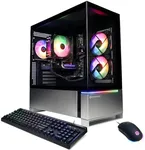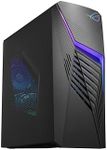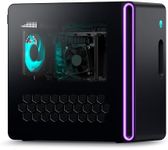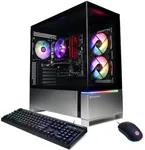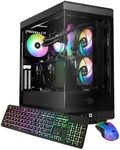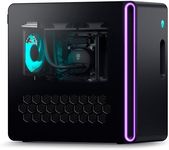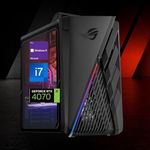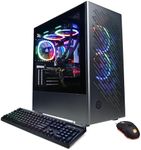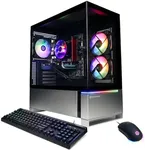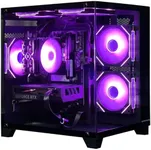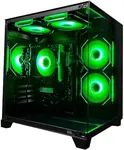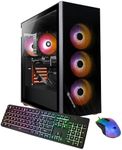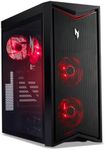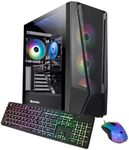Buying Guide for the Best Gaming Desktop
When choosing a gaming desktop, it's important to consider several key specifications to ensure you get the best performance for your gaming needs. A gaming desktop should be powerful enough to handle the latest games at high settings, while also being future-proof to some extent. Here are the key specs you should focus on and how to navigate them to find the best fit for you.Processor (CPU)The CPU is the brain of your gaming desktop and is crucial for overall performance. It handles all the calculations and processes that allow your games to run smoothly. CPUs are typically divided into entry-level, mid-range, and high-end categories. Entry-level CPUs are suitable for casual gaming and older titles, mid-range CPUs can handle most modern games at decent settings, and high-end CPUs are designed for the latest games at the highest settings. If you plan to play demanding games or multitask while gaming, opt for a mid-range or high-end CPU.
Graphics Card (GPU)The GPU is responsible for rendering images, videos, and animations, making it one of the most critical components for gaming. A powerful GPU ensures smooth gameplay and high-quality graphics. GPUs are categorized into entry-level, mid-range, and high-end. Entry-level GPUs can handle less demanding games and lower settings, mid-range GPUs are suitable for most games at medium to high settings, and high-end GPUs are necessary for the latest games at ultra settings and high resolutions. Choose a GPU based on the types of games you play and the visual quality you desire.
Memory (RAM)RAM is the short-term memory of your gaming desktop, allowing it to quickly access data needed for running games and applications. More RAM can improve performance, especially in games that require a lot of resources. Gaming desktops typically come with 8GB, 16GB, or 32GB of RAM. 8GB is the minimum for modern gaming, 16GB is ideal for most gamers and provides a good balance of performance and cost, while 32GB is for those who want to future-proof their system or run very demanding applications alongside gaming. Consider your gaming habits and multitasking needs when choosing the amount of RAM.
StorageStorage determines how much space you have for games, applications, and other files. There are two main types of storage: Hard Disk Drives (HDDs) and Solid State Drives (SSDs). HDDs offer more storage at a lower cost but are slower, while SSDs are faster and improve load times but are more expensive. Many gaming desktops come with a combination of both, using an SSD for the operating system and frequently played games, and an HDD for additional storage. Aim for at least 512GB of SSD storage for a good balance of speed and capacity, and consider additional HDD storage if you have a large game library.
Cooling SystemA good cooling system is essential to keep your gaming desktop running efficiently and to prevent overheating during long gaming sessions. There are air cooling and liquid cooling systems. Air cooling is more common and sufficient for most users, while liquid cooling provides better performance and is quieter but can be more expensive and complex to maintain. If you plan to overclock your CPU or GPU, or if you live in a hot climate, investing in a better cooling system is advisable. Choose a cooling system based on your performance needs and the environment in which you'll be using your desktop.
Power Supply Unit (PSU)The PSU provides power to all the components of your gaming desktop. It's important to have a reliable PSU with enough wattage to support your system, especially if you have high-end components. PSUs are rated by wattage and efficiency. A higher wattage PSU can support more powerful components and future upgrades, while higher efficiency (80 Plus ratings) means less wasted energy and lower electricity bills. Calculate the power requirements of your components and choose a PSU with a bit of extra headroom to ensure stable performance.
MotherboardThe motherboard is the main circuit board that connects all the components of your gaming desktop. It determines the compatibility and potential for future upgrades. Motherboards come in different sizes (ATX, Micro-ATX, Mini-ITX) and feature sets. Ensure the motherboard has the necessary slots and ports for your components, including enough RAM slots, PCIe slots for GPUs, and USB ports. If you plan to upgrade your system in the future, choose a motherboard with additional slots and support for newer technologies.
